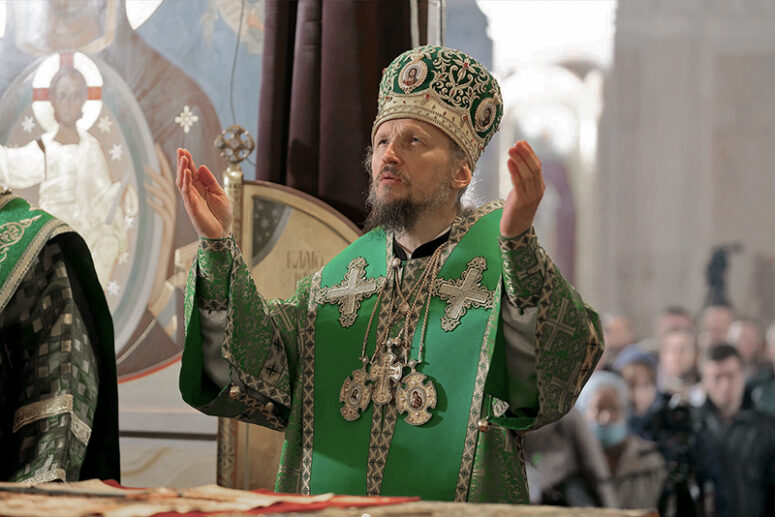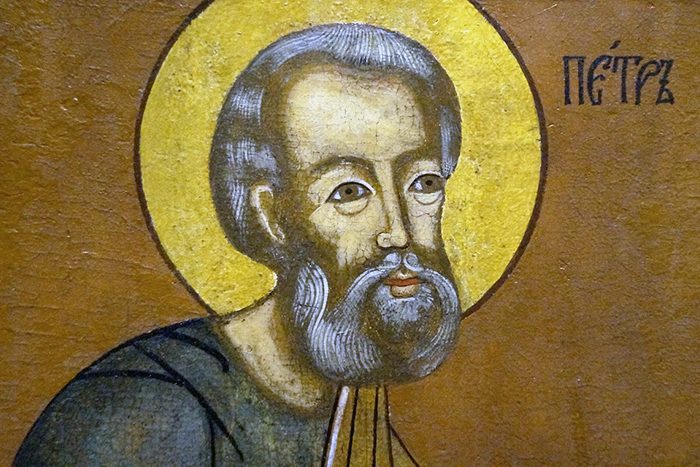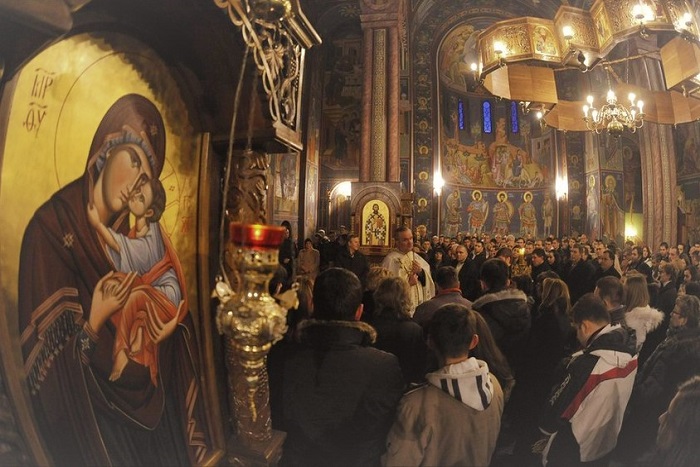
Commemorating the dead is one of the most important elements of Orthodox worship. During litias, prayer and memorial services we ask God to show mercy to our living and departed friends and family members. One of the most important church commemorations is the rite of proskomedia , where besides the preparation of bread and wine for the celebration of the Eucharist, saints and ordinary members of the church are remembered. Most commonly, liturgical commemoration means proskomedia. It may also refer to the augmented litany, to which a memorial litany is often added in Russia. In rare cases the commemoration may take place during the Great Entrance. There is however one more special commemoration that many lay people do not know about, namely the commemoration at the Intercession Prayer, discussed in this article.
The Significance
The term “Intercession Prayer” appeared in liturgical science only in the 19th-20th centuries, but the part of the service that it refers to may have existed as early as in the Apostolic times. The first possible mentions of this liturgical element are found in the Didache (10. 5), one of the oldest Christian monuments of the early 2nd century. The Intercession is a separate commemorative and petitionary part of the anaphora, usually placed at the end of the Eucharistic prayer, after the transubstantiation of the bread and wine into the Body and Blood of Christ.
Notably, the Ancient Church, gathering around the Altar and celebrating the Eucharist, interceded, among other church members, for the saints (!) who were already glorified and reigning with Christ in Heaven. In the modern sense, it is we who need the prayers of the saints, while they no longer need prayers. But looking at the example of the Intercession Prayer found in the Liturgy of St John Chrysostom (see Service Book) we see that the ancient church saw it differently. Reflecting the ecumenical character of the Liturgy, the intercession prayer extended to all members of the Church, including the living and deceased, the rulers, the imprisoned and “exiled to quarries” (see the intercession prayer of the Liturgy of St Basil the Great), all the sick, orphans, widows and all peoples in general. The Intercession prayer is present in all types of liturgies, but its position varies in different rites. For example, in some liturgies of the Alexandrian Coptic tradition the intercession is not located at the end of the Anaphora, but before the Sanctus (“Holy, Holy, Holy, Lord of hosts…”). In fact, the commemoration at the Intercession is more ancient than the one during the proskomedia, not to mention the petitions of the augmented litany and various prayer services. Why did the Church attach such great importance to this part of the service, and why is it also important for the laity?
Testimony of the Fathers
Here are some of the most important comments of the Holy Fathers about the power of this commemoration. St John Chrysostom, speaking about this part of the service, says that the Son of God and the angels are already present among the faithful during it. “You can submit your petitions to the king while he is in his throne, but they will be in vain when he leaves. Similarly, it is the greatest honor for all to be commemorated while the Sacraments are being offered.” Therefore, the deacon proclaims: “For all those who have died in Christ and for all those who commemorate them,” and “the clergy stand, proclaiming names in the midst of a common silence” (On Acts. Talk 21: 5).
St Cyril of Jerusalem agrees with St John: “After … this Bloodless service with its Spiritual Sacrifice is completed, we pray to God for the granting of universal peace to His church, for peace throughout the earth, for rulers and warriors, for the sick and mourning — for all who need help and support, we all pray and offer this sacrifice. We also pray for all those who have reposed … believing that by doing so we bring great benefit to their souls during the offering of this sacred and tremendous sacrifice ”(Mystery Teachings, 5: 7-9). Here we see the same meaning of the intercession. However, one can notice a certain difference between the practice of the Jerusalem Church and the Church of Antioch, to which Chrysostom belonged. St Cyril says that the living are commemorated first, and then the departed, while in the Liturgy of Chrysostom the departed are commemorated before the living, immediately after the saints.
The 14th century saint Gregory Palamas adheres to the same logic of divine services: “Because it is the true Body and Blood of Christ that is being offered, it speaks to God the Father much more expressly than the blood of Abel, because the latter was crying out to God against Abel’s brother, while the Blood of Christ is appealing for us, whom the Lord has endowed with such dignity, that he became our Brother. The Eucharist propitiates the Father to us and reconciles us to Him ”(Talk 56 about the Holy and Terrible Mysteries of Christ, spoken 4 days before the Nativity of Christ § 10).
As evidenced by the Holy Fathers, the intercessory part of the Eucharist, which, unfortunately, is mostly hidden from the ears of the laity (with the exception of small excerpts, i. e. the exclamations “Especially for our all-holy” and “Among the first remember, Lord”), is perhaps one of the most heartfelt commemorations, because it is performed before the newly-transubstantiated Lamb, i.e. before Christ himself. This moment of the Liturgy embodies its most ancient intercessory part, commemorating the whole world, the saints and even the Mother of God. Many priests include into it the names of those in particular need of special commemoration, while the laity, hearing the exclamation “Especially for our all-holy” can also take an extra moment to commemorate their loved ones, whether living or deceased.




